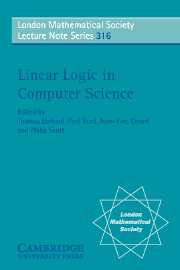1 - Category Theory for Linear Logicians
Published online by Cambridge University Press: 17 May 2010
Summary
Abstract
This paper presents an introduction to category theory with an emphasis on those aspects relevant to the analysis of the model theory of linear logic. With this in mind, we focus on the basic definitions of category theory and categorical logic.
An analysis of cartesian and cartesian closed categories and their relation to intuitionistic logic is followed by a consideration of symmetric monoidal closed, linearly distributive and *-autonomous categories and their relation to multiplicative linear logic. We examine nonsymmetric monoidal categories, and consider them as models of noncommutative linear logic. We introduce traced monoidal categories, and discuss their relation to the geometry of interaction. The necessary aspects of the theory of monads is introduced in order to describe the categorical modelling of the exponentials. We conclude by briefly describing the notion of full completeness, a strong form of categorical completeness, which originated in the categorical model theory of linear logic.
No knowledge of category theory is assumed, but we do assume knowledge of linear logic sequent calculus and the standard models of linear logic, and modest familiarity with typed lambda calculus.
Introduction
Category theory arose as an organizing framework for expressing the naturality of certain constructions in algebraic topology. Its subsequent applicability, both as a language for simply expressing complex relationships between mathematical structures and as a mathematical theory in its own right, is remarkable. Categorical principles have been put to good use in virtually every branch of mathematics, in most cases leading to profound new understandings.
Roughly a category is an abstraction of the principle that the morphisms between objects of interest are just as important as the objects themselves.
- Type
- Chapter
- Information
- Linear Logic in Computer Science , pp. 3 - 64Publisher: Cambridge University PressPrint publication year: 2004
- 13
- Cited by



